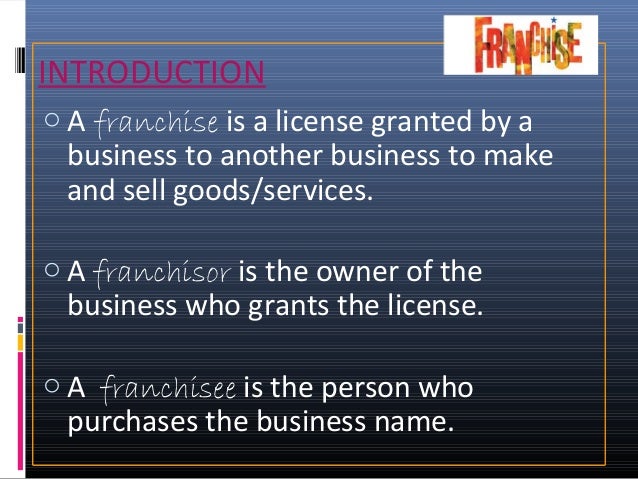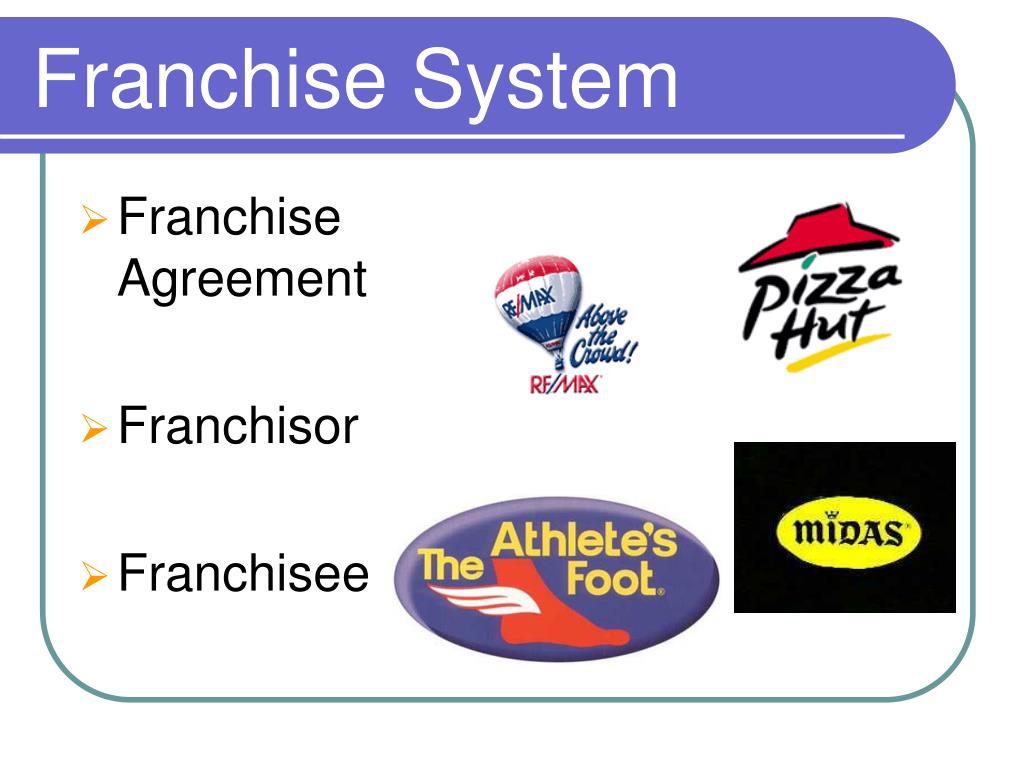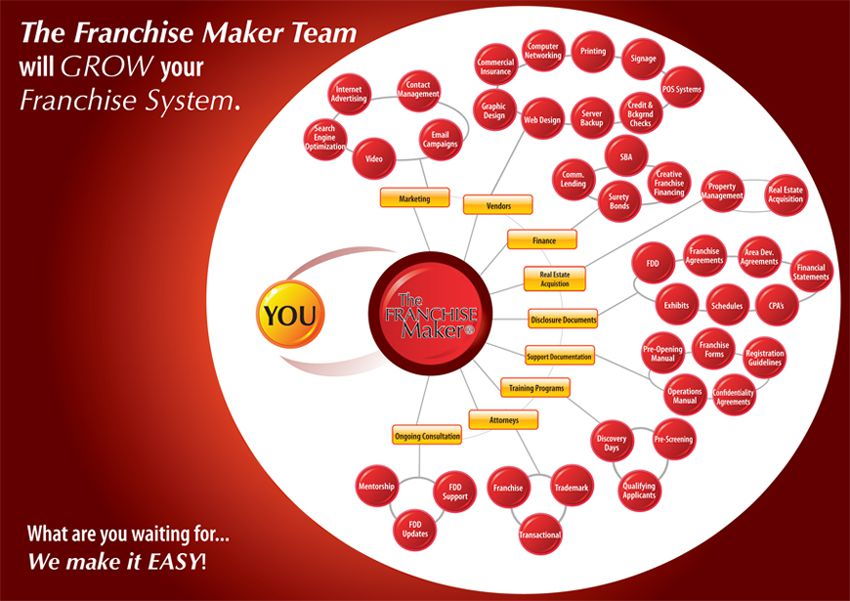
How to create a franchise system?
Step One: Step One: Evaluate if Your Business is Ready
- Consider your concept. Most good franchise concepts, he says, offer something familiar, but with some unique twist to it. ...
- Check your financials. Most successful franchises take a business that's already profitable and try to replicate that success in other locales.
- Gather market research. ...
- Prepare for change. ...
- Evaluate other alternatives. ...
How to set up a franchise?
Set Up Your Franchise Agreement Part of running a franchise is finding the right balance between staying on-brand and allowing each independent franchisee the proper amount of autonomy. Decide early on what aspects of branding, customer service, menu items, décor, marketing materials, etc. will be important to maintain from franchise to franchise.
Why is franchise systems fail?
- The Franchisor or master franchisor doesn’t even have documented proven systems.
- The”Business Opportunity is oversold. ...
- The Franchisor or master franchisor was no real history in the business.
- The training and support systems are not thorough enough.
- The Franchisor put the franchise into a finance situation that places huge pressures on the cashflow. ...
Why not to franchise?
8 reasons not to franchise your business. 1. Too many moving parts. The most successful franchises have simplified their concepts so that franchisees can replicate them with high-quality—or at least standardized—results. A restaurant concept that involves white tablecloths, a full wait staff, and an extensive menu poses some serious ...

What is a franchise system and how does it work?
A franchise enables you, the investor or franchisee, to operate a business. You pay a franchise fee and you get a format or system developed by the company (franchisor), the right to use the franchisor's name for a specific number of years and assistance.
What type of system is a franchise?
The franchise is a system used to commercialize products, services or technology, based on the close and continuous collaboration between legally and financially different and independent companies – the franchisor and its individual franchisees.
What is a franchise with example?
Franchising is a business relationship between two entities wherein one party allows another to sell its products and intellectual property. For example, several fast food chains like Dominos and McDonalds operate in India through franchising.
What are two types of franchise systems?
There is a wide variety of types of franchise structures used in the industry today. There are two main types of franchising, known as Product Distribution Franchising (Traditional Franchising) and Business Format Franchising, which are conducted under a variety of franchise relationships.
What are the 4 types of franchise?
The four types of franchise business you can invest inJob or operator franchise. These owner operator franchises are usually home based, which keeps overheads down to a minimum. ... Management franchise. ... Retail and fast food franchises. ... Investment franchise.
What are the 3 types of franchise?
There are three main types of franchise opportunities available, these are: Business format franchises. Product franchises, or Single operator franchises. Manufacturing franchises.
What are the benefits of franchising?
There are several advantages of franchising for the franchisee, including:Business assistance. One of the benefits of franchising for the franchisee is the business assistance they receive from the franchisor. ... Brand recognition. ... Lower failure rate. ... Buying power. ... Profits. ... Lower risk. ... Built-in customer base. ... Be your own boss.
What is a good example of a franchise?
Some of the most successful franchise businesses in the United States include Subway, McDonald's, Pizza Hut, Burger King, and Dunkin' Donuts; but restaurants are not the only kind of franchise businesses available. Some business types are more appropriate for franchising than others.
What are two advantages of a franchise?
Advantages of buying a franchise You don't necessarily need business experience to run a franchise. Franchisors usually provide the training you need to operate their business model. Franchises have a higher rate of success than start-up businesses. You may find it easier to secure finance for a franchise.
What are the elements of franchise?
The 5 Elements of a Successful FranchisePowerful business systems.Serious brand power.Innovation.Powerful franchisee training.Wealthy franchisees.
What are the characteristics of a franchise business?
With this business model, you get the right to use a company's logo, name, know-how and products in exchange for a fixed fee, a percentage of gross sales and recurring payments. The franchisor, or business owner, will provide you with everything you need to become successful, from training to marketing materials.
What type of franchise is mcdonalds?
McDonald's operates a heavy-franchised business model, where most stores are franchisees.
Is franchise a B2B?
B2B, short for business-to-business, is a sector of franchising that's a bit under the radar. That's because these franchises are not as visible as food or retail franchises. But their lack of visibility shouldn't be a deterrent.
Are there different types of franchise models?
There are 4 types of franchise models: Company Owned Franchise Operated (COFO) Franchise Owned Company Operated (FOCO) Franchise Owned Franchise Operated (FOFO)
What are the elements of a franchise?
The 5 Elements of a Successful FranchisePowerful business systems.Serious brand power.Innovation.Powerful franchisee training.Wealthy franchisees.
Why franchising is a smart business solution?
Franchising allows companies to compete with much larger businesses and saturate markets before their competitors can respond. Franchising can help a business grow on both sides of the fence. The franchisors' principal benefit is that they can expand more entities rapidly across different locations.
What Is a Franchise?
A franchise is a type of license that grants a franchisee access to a franchisor's proprietary business knowledge, processes, and trademarks , thus allowing the franchisee to sell a product or service under the franchisor's business name . In exchange for acquiring a franchise, the franchisee usually pays the franchisor an initial start-up fee and annual licensing fees .
What is franchise contract?
Franchise Basics and Regulations. Franchise contracts are complex and vary for each franchisor. Typically, a franchise agreement includes three categories of payment to the franchisor. First, the franchisee must purchase the controlled rights, or trademark, from the franchisor in the form of an upfront fee.
What Are the Risks of Franchises?
Disadvantages include heavy start-up costs as well as ongoing royalty costs. By definition, franchises have ongoing fees that must be paid to the franchisor in the form of a percentage of sales or revenue. This percentage can range between 4.6% and 12.5%, depending on the industry.
How Does the Franchisor Make Money?
Typically, a franchise agreement includes three categories of payment to the franchisor. First, the franchisee must purchase the controlled rights , or trademark , from the franchisor in the form of an upfront fee. Second, the franchisor often receives payment for providing training, equipment, or business advisory services. Finally , the franchisor receives ongoing royalties or a percentage of the operation's sales.
What does a franchisor receive?
Finally, the franchisor receives ongoing royalties or a percentage of the operation's sales. A franchise contract is temporary, akin to a lease or rental of a business.
How long does a franchise contract last?
It does not signify business ownership by the franchisee. Depending on the contract, franchise agreements typically last between five and 30 years, with serious penalties if a franchisee violates or prematurely terminates the contract.
When a business wants to increase its market share or geographical reach at a low cost, it may franchise its product?
When a business wants to increase its market share or geographical reach at a low cost, it may franchise its product and brand name. A franchise is a joint venture between franchisor and franchisee. The franchisor is the original business. It sells the right to use its name and idea. The franchisee buys this right to sell the franchisor's goods or services under an existing business model and trademark .
What is the purpose of a franchise?
The primary objective of all grants of franchises is to benefit the public ; the rights or interests of the grantee, the franchisee, are secondary. A corporation is a franchise, and the various powers conferred on it are also franchises, such as the power of an insurance corporation to issue an insurance policy.Various types of business—such as water companies, gas and electric companies, bridge and tunnel authorities, taxi companies, along with all types of corporations—operate under franchises.
Why are franchisees being victimized?
In states without "good cause" laws, franchisees claim that they are being victimized by franchisors who want to reclaim outlets that have proven to be highly profitable. They allege that the franchisor imposes impossible or ridiculous demands that cannot be met to harass the franchisee into selling the store back to the franchisor at a fraction of its value. Company-owned outlets yield a greater profit to the franchisor than the royalty payments received from the franchisee. Other franchisees claim that their licenses have been revoked or not renewed upon expiration because they complained to various state and federal agencies of the ways in which the franchisors operate. Such controversies usually are resolved in the courtroom.
What is franchising joint obligation?
In franchising, both franchisors and franchisees are to recognize that the advancement of the franchise system is a joint obligation.
When did the FTC issue the disclosure requirements for franchises?
The Federal Trade Commission (FTC) received numerous complaints about inequitable and dishonest practices in the sale of such franchises. In late 1978, it issued regulations, effective October 21, 1979, that require franchisors and their representatives to disclose material facts necessary to make an informed decision about the proposed purchase of a franchise and that establish certain practices to be observed in the franchisor-franchisee relationship. These rules are collectively known as the Disclosure Requirements and Prohibitions Concerning Franchising and Business Opportunity Ventures, or more simply, the Franchise Rule.
How can a franchise be terminated?
A franchise can be terminated by the mutual agreement of the state that is the franchisor, and the grantee or the franchisee. It can be lost by Abandonment, such as when a corporation dissolves because of its fiscal problems. A mere change in the government organization of a political subdivision of a state does not divest franchise rights that have been previously acquired with the consent of local authorities. A franchise cannot be revoked arbitrarily unless that power has been reserved by the legislature or proper agency.
How many questions were asked in the franchise survey?
The survey included 33 benchmark questions, about their experience and satisfaction regarding critical areas of their franchise systems, including training & support, operations, franchisor/franchisee relations, and financial opportunity.
What is a corporation charter?
The charter of a corporation is also called its general franchise. A franchise tax is a tax imposed by the state on the right and privilege of conducting business as a corporation for the purposes for which it was created and in the conditions that surround it.
What is a franchise?
A franchise is a contractual arrangement which is entered into for a specified period of time, with the franchisee paying a royalty to the franchisor for the rights assigned. Examples of franchises include the McDonald Burger and Kentucky Fried Chicken diner chains, Tie Rack and Dyno-Rod.
What is franchising in business?
Franchises are a form of co-partnership, offering mutual benefits. They allow the franchisor to expand sales rapidly and widely, sometimes on a global basis, without having to raise large amounts of capital, by building on the efforts of a highly motivated team of entrepreneurs. Individual franchisees are usually required to contribute the bulk of the investment in physical assets and hence have a personal interest in the success of the venture. For his part, the franchisee obtains access to an innovative product or novel selling method, with the franchisor providing back-up, technical assistance, specialized equipment and advertising and promotion. See VERTICAL MARKETING SYSTEM, BUSINESS STRATEGY, EXTERNAL GROWTH, BUSINESS FORMAT FRANCHISING.
What is a government franchise?
2. A right granted to another party by a government to engage in certain types of business. For example, a firm may obtain a government franchise to supply certain public services within a limited geographic region.
What is franchise agreement?
An agreement in which an entrepreneur buys a license to use another business' products, brand, proprietary knowledge, and trade secrets. This allows the entrepreneur to start a business without building up his/her own brand or products. This is a common way to start a business, especially in highly competitive industries. An industry that utilizes franchises on a regular basis is fast food; because of stiff competition, it is generally more profitable for one who wishes to start a fast food restaurant to buy a franchise.
Franchise System
1. AGENDA Agenda Introduction What is it ? Examples Top Rated Franchise Sucess Rate Industry overview Suitability • • • • • • • • Revenue Streams ROI Types COMMON FACTORS Is it a Good Time? Summary Questions & Answers THANK YOU!
Editor's Notes
The Business Options accreditations enable us to provide advice on a wide range of expansion models not just franchising.

What Is A Franchise?
Understanding Franchises
- When a business wants to increase its market share or geographical reach at a low cost, it may franchise its product and brand name. A franchise is a joint venture between a franchisor and a franchisee. The franchisor is the original business. It sells the right to use its name and idea. The franchisee buys this right to sell the franchisor's goods or services under an existing business m…
Franchise Basics and Regulations
- Franchise contracts are complex and vary for each franchisor. Typically, a franchise agreement includes three categories of payment to the franchisor. First, the franchisee must purchase the controlled rights, or trademark, from the franchisor in the form of an upfront fee. Second, the franchisor often receives payment for providing training, equipment, or business advisory servic…
Pros and Cons of Franchises
- There are many advantages to investing in a franchise, and also drawbacks. Widely recognized benefits include a ready-made business formula to follow. A franchise comes with market-tested products and services, and in many cases established brand recognition. If you're a McDonald's franchisee, decisions about what products to sell, how to layout your store, or even how to desig…
Franchise vs. Startup
- If you don't want to run a business based on someone else's idea, you can start your own. But starting your own company is risky, though it offers rewards both monetary and personal. When you start your own business, you're on your own. Much is unknown. "Will my product sell?", "Will customers like what I have to offer?", "Will I make enough money to survive?" The failure rate for …